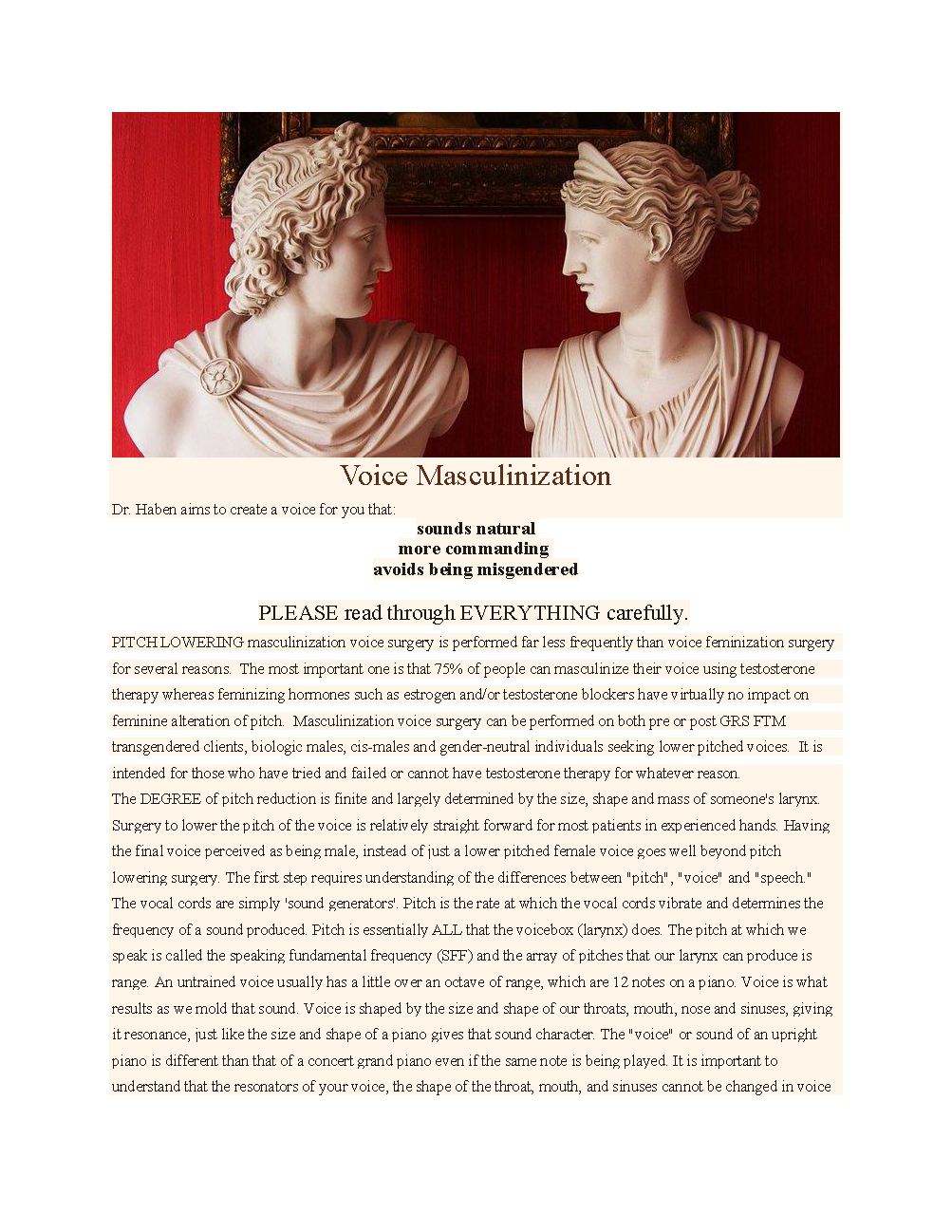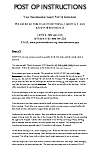
OFFICE HOURS |
OFFICE INFORMATION |
||
|
Monday - Friday |
8:30am - 4:30pm |
980 Westfall Road |
[Phone] 585.442.1110 |
 |
I Would Like To: |
Voice Masculinization
Dr. Haben aims to create a voice for you that:
more commanding
avoids being misgendered

August 2022, Dr. Haben co-edited the definitive guide to Gender Affirmation Surgery of the voice, face and neck, in addition to authoring two of the chapters. The chapters are here available for download:
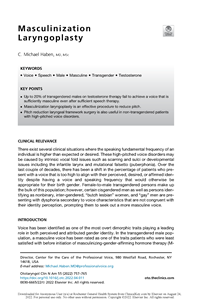 ..
.. 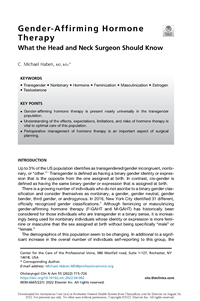
PLEASE read through EVERYTHING carefully.
PITCH LOWERING masculinization voice surgery can be performed on both cisgendered and transgendered males, with or without augmentation of the Adam’s Apple, if desired. A trial of testosterone therapy is not a pre-requisite. In those who are, or having had been on testosterone, pitch reduction is usually realized by 6 months and levels off by 1 year. In other words, the degree to which testosterone therapy lowers the pitch of the voice is generally maximized by 12 months. Additional testosterone therapy typically does not result in further pitch reduction.
The DEGREE of pitch reduction is finite and largely determined by the size, shape, condition and mass of the larynx, as well as one’s baseline speaking fundamental frequency. We aim to achieve the greatest amount of pitch reduction an individual’s anatomy will allow.Range of Male and Female voices

The average cisgendered male speaking fundamental frequency is roughly 120 hertz with a range between 85 to 155 hertz, or roughly 9 semitones (notes) lower on a piano than a cisgendered female. Pitch reduction is finite in everyone and largely depends on baseline unplaced pitch, natural lower range and laryngeal anatomy.
In cisgendered men, depending on where one’s voice starts out, as well as the extent of the lower vocal range and anatomy, pitch may be lowered up to 1/3 of an octave or 4 notes (approximately 20-25 hertz, ±5-15 hertz) from the unplaced baseline voice. Not all clients get meaningful pitch reduction while others achieve a significantly greater degree.
In transgendered men, depending on where one’s voice starts out, as well as the extent of the lower vocal range and anatomy, pitch may be lowered up to 2/3 of an octave or 8 notes (approximately 60-75 hertz ±25-40 hertz) from the unplaced baseline voice. Not all clients get meaningful pitch reduction while others achieve a significantly greater degree.
Please see below for more information regarding the metrics of success and guarantees. A thorough in-person, preoperative evaluation will help predict the degree of pitch reduction that could be achieved under ideal conditions.
Surgery
If you look on the inside of a piano, the lower notes have strings that are thicker, longer and less tension. Human vocal cords vibrate in much the same way. The goal of masculinization voice surgery is to make the vocal cords act thicker, longer and less tense to vibrate at a slower frequency which equates to a lower pitch. To achieve this, voice masculinization surgery requires a transcervical ("incision in a neck crease") approach and takes about 1-1.5 hours in the operating room under sedation anesthesia. Endoscopic-only surgery is not effective.
Questionnaire
Please fill out the medical and voice questionnaire E-MAIL at the top of the page AFTER having read all the essential information here. Please specify if you are a cisgendered or transgendered male; had or having a trial of testosterone; are or ever were a smoker; have a chronic medical condition such as diabetes, take blood thinners, or ever had surgery on your vocal cords or throat (for any reason).
Examples
The following examples represent AVERAGE results that a TYPICAL CIS-gendered man undergoing voice masculinization could achieve. These examples aim to provide potential clients with realistic, achievable, and reasonable expectations in most cases. In each example the client is first reading the "rainbow passage" (preoperative) and then re-reading the same passage at least 3 months postoperative. Final results can never be guaranteed. PLEASE NOTE that we do NOT use our patients for advertising as is commonly done in other countries. We post a reasonable number of AVERAGE outcomes rather than the best-of-the-best results advertised elsewhere.
The following examples represent AVERAGE results that a TYPICAL transgendered man undergoing voice masculinization could achieve. These examples aim to provide potential clients with realistic, achievable and reasonable expectations in most cases. In each example the client is first reading the "rainbow passage" (pre-operative) and then re-reading the same passage at least 3 months post-operative. Final results can never be guaranteed. PLEASE NOTE that we do NOT use our patients for advertising as is commonly done in other countries. We post a reasonable number of average outcomes rather than the best-of-the-best results advertised elsewhere.
Cost
PLEASE NOTE:
Costs are dictated by the hospital and anticipated to increase annually.
All masculinization voice surgeries are considered elective cosmetic procedures, and, as such, are not covered by any private or government insurance, in whole or in part regardless of insurance policies or coverage elsewhere. Unfortunately, we do not participate in Care Credit or have payment plans available.
Each of the procedures come packaged to include the cost of the surgery; pre-operative consultations and all post-operative visits; ALL hospital charges for outpatient surgery including associated anesthesia and hospital/ facility fees. Postoperative medications are not included; however, private insurance frequently covers this modest expense. Travel, lodging, airport/ hospital/ clinic transfers; meals; entertainment; special testing, postoperative medications, and overnight in-patient hospital observation (if necessary) are not included in the package. Overnight hospital observation is mandatory for those traveling without a chaperone.
PLEASE read the sections on REFUNDS, GUARANTEES and REVISIONS carefully.
The package for masculinization voice surgery is approximately $8,825 (inclusive of the deposit). The hospital requires payment of a $3,000 credit card deposit to secure a confirmed surgery date. The surgery deposit is non-refundable.
NOTE: Additional cost for overnight hospital observation for clients without a chaperone is approximately +$1,190.
Adam’s Apple augmentation
Although masculinization voice surgery is intended to be functional, a surgical implant to increase the projection of the Adam’s Apple may be done, if desired. The following example represents an ABOVE-average result that a cis- or trans-gendered man undergoing augmentation of the Adam’s Apple with voice masculinization could achieve. There are many factors which influence the cosmetic outcome of an Adam’s Apple augmentation. These are discussed in detail during the initial consultation. As such, final cosmetic outcomes can never be guaranteed. The Adam’s Apple augmentation add-on cost to the masculinization surgery is currently +$500.
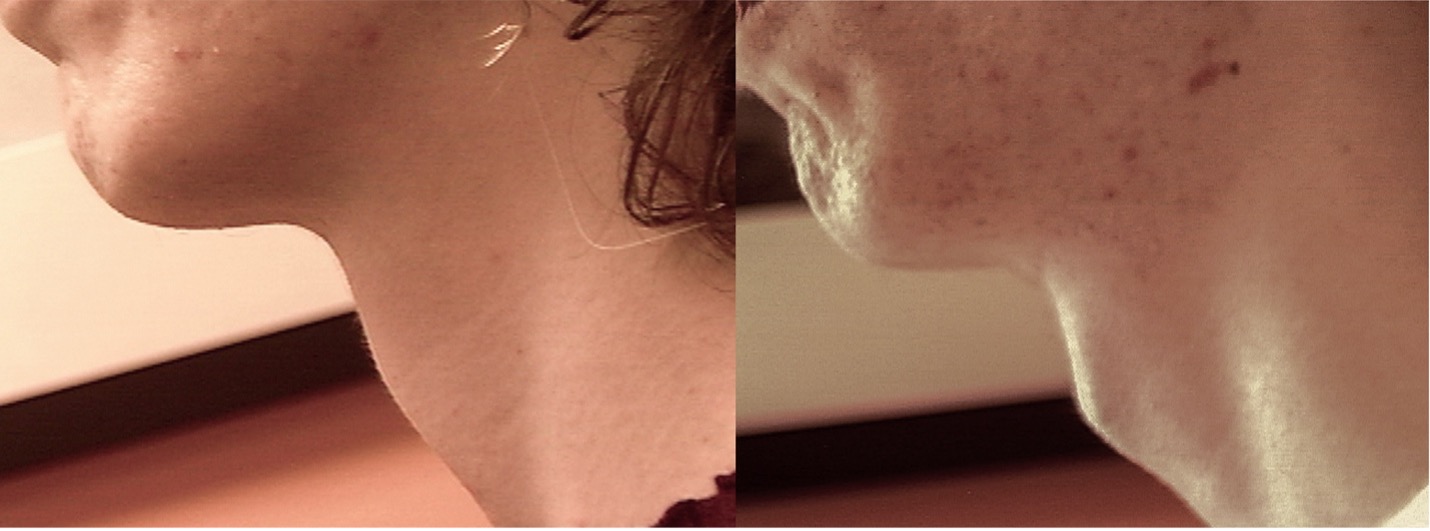
Pre- and 2-year post-operative example of an Adam’s Apple augmentation
Refunds
What is the policy regarding refunds? Can surgery be rescheduled?
A: We understand emergencies occur. We are happy to reschedule your surgery at no additional cost, however, should you need to reschedule until a subsequent calendar year, you would be subject to any cost increase imposed by the hospital. If the rescheduled date falls within the same calendar year as the original surgery date, no cost increase will occur. Surgery deposits are NON-REFUNDABLE under all circumstances once made UNLESS at the time of the INITIAL consultation a client is not deemed a surgical candidate at the sole discretion of Dr. Haben. In the exceedingly rare circumstance when this occurs, clients are issued an immediate refund of the surgery deposit minus the consultation fee. Surgery deposits otherwise do not expire and can be applied at any point in the future towards a procedure. Prevailing costs at the time of rescheduling would apply.
What if my case is cancelled/postponed for a medical reason?
A: It is particularly important that you disclose any medical condition well before surgery. Should you develop a cough, cold, flu, illness (including COVID-19) or breathing problem the week or two before surgery you must call the office at once. Your surgery may need to be rescheduled at no additional cost if within the same pricing period. Rarely, clients are not cleared for surgery due to an undisclosed medical condition after they have travelled to New York and are awaiting their procedure. The surgery will be postponed until the medical condition has been evaluated/ corrected and rescheduled for the first available date. There may be hospital costs if unexpected or additional testing is required. No reimbursement is possible for the transportation and lodging expenses incurred.
What if I miss my pre-operative consultation the day before surgery?
A: The pre-op consultation on the day or two before surgery is mandatory even if you have had a prior in-person consultation. If you miss this appointment your surgery will be rescheduled even if it was missed due to travel delays / bad weather or circumstances beyond your control. We recommend anyone traveling during the winter months, having a connecting flight, or coming internationally to arrive a day early.
Guarantees
Are my results or degree of pitch reduction guaranteed? Am I paying for a surgery or a specific result?
A: You are paying for a surgical procedure which has inherent risks, including that of non-healing, surgical failure and suboptimal results. The degree of pitch reduction is finite and largely determined by the size, shape, age, condition and mass of your larynx. As such, there can be no outcome guarantees.
Revisions
Can the surgery be revised if I wish for more pitch reduction? Is there a cost?
A: It is unusual for voice masculinization surgery to require revision at our practice. Unfortunately, the pitch is usually lowered to the greatest amount allowed by one's anatomy and additional meaningful pitch reduction is not physically possible. Rarely, this is not the case and revision surgery could be considered. Determining the best path forward requires an in-personal evaluation and discussion, which is included as part of the previous package’s post-operative care. The revision surgery itself is NOT included.
NOTE: As with procedures paid for by private or government insurance, revision surgery will incur charges dictated by the hospital.FAQ
What if I would like to come in just for a consultation?
A: Consultations are for one hour and include voice analysis, physical examination, a scope of the larynx and a lengthy discussion regarding expectations. The $500 consultation fee will be applied towards the surgery deposit.
Can't I just send you a voice recording?
A: Voice analysis is only a small part of determining whether a client is a suitable candidate for voice surgery and cannot replace an in-person consultation which requires a scope of the larynx.
Can I get a letter of support for name/gender change legal petitions?
A: Absolutely, once the procedure has been completed.
Where is the incision?
A: The incision is made in a skin crease in the middle of the neck. The incision is hidden as best as possible in a skin crease and closed using plastic surgery technique. Incisions take 12 months to fully mature. See the POSTOPERATIVE section below for more information.
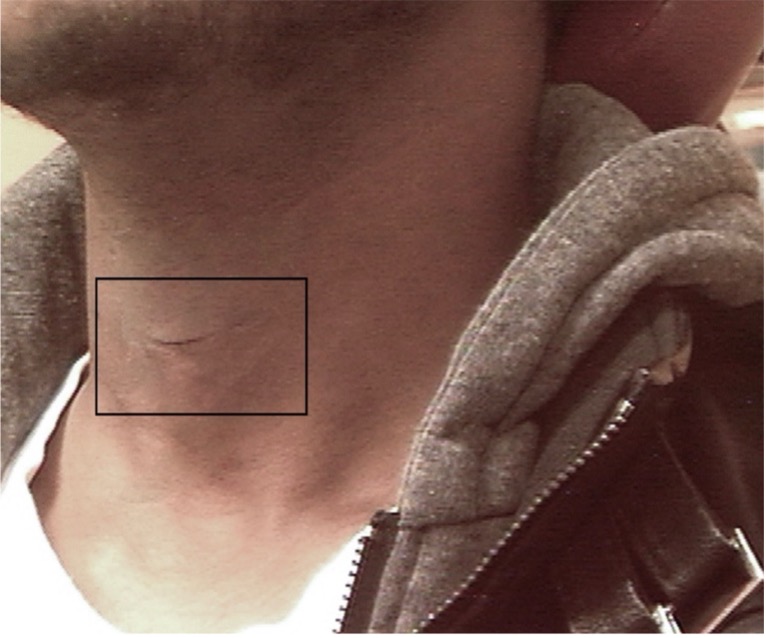
Example of the size and placement of a masculinization incision on the 10th post-operative day which is NOT MATURE. It is intentionally included here to give clients an expectation during the healing process.
General
How many surgeries does the Center perform? Is the surgeon Board Certified? Fellowship trained?
A: The Center is dedicated to laryngeal surgery. Dr. Haben has performed hundreds of pitch alteration surgeries and thousands of voice procedures. The different techniques involved in masculinization voice surgery have been developed by Dr. Haben and continue to be perfected at the practice over the last 20+ years. Dr. Haben is Board Certified in Otolaryngology and Fellowship trained in laryngology and voice surgery, as well as earning a Master's Degree for research in voice and laryngology. Dr. Haben routinely lectures and publishes on voice surgery and related topics. Recently, he authored and edited a special edition of Clinics of Otolaryngology on gender affirmation surgery for ears, nose and throat physicians and lectures at the American Academy as an expert on masculinization voice surgery. A copy of his publication on the topic may be found above.
Why is a chaperone needed after the surgery? What if I do not have one?
A: It is mandatory hospital, State and Federal guidelines that any patient undergoing sedation anesthesia MUST have a responsible adult with them for 24 hours after surgery. An acceptable chaperone must be 18 years or older and known to the client for at least one year. It is UNACCEPTABLE to "meet" a chaperone while in Rochester, "bunk" with another client having surgery the same day, or "hire" someone to stay with you. If you are not accompanied by an acceptable chaperone, you will be required to spend the night in the hospital at additional cost.
Do you accept Care Credit? How much is required to confirm a surgery date? What payments are accepted? What happens if I need to change the surgery date at the last minute? How far in advance do you book?
A: The practice does not accept Care Credit. Credit cards are the preferred method of payment. Surgery may only be booked and confirmed once the deposit is made. Changes are permitted without penalty, as long as the policy is not repetitively abused and the new surgery dates falls within the same calendar year. Rescheduled surgery dates to a subsequent calendar year may be subject to hospital imposed annual price increases. Most non-peak surgery dates book 2-3 months in advance.
Do you accept Medicare or private insurance for masculinization? Do I get any forms that can be submitted to my insurance? Or to my accountant for taxes? Is there a procedure (CPT) code for the surgery?
A: Masculinization voice surgery is an elective cosmetic procedure. We neither accept Government nor private insurance for the procedure. We are not permitted to submit any forms to government or private insurance. An itemized receipt for the surgical deposit is provided. Itemized receipt for hospital charges can only be obtained by the patient directly from the hospital. We are not responsible for insurance reimbursement, tax rebates or credits. Receipts can NOT be altered, modified or amended under any circumstance to meet any requested criteria. The procedure (CPT) code used for masculinization laryngoplasty is 31599.
All your surgery dates are on Wednesdays. Do you operate any other day?
A: No. All surgeries occur on a Wednesday, and the practice cannot accommodate special requests.
How will we communicate?
A: It is vitally important that we have an accurate e-mail, telephone number and current mailing address. ALL confirmations and instructions occur via e-mail, and it will be your responsibility to check your e-mail often as your surgery date approaches.
Travel
Can I book my travel first and then call for a surgery date?
A: No. Surgery dates are not confirmed until the deposit is paid. We cannot "hold" a date without payment and strongly advise against booking travel until you receive confirmation of your surgery date by e-mail.
Any advice for foreign travelers?
A: We recommend informing your credit card company of your travels and having a back-up just in case.
Medical Questions
Is there preoperative testing required? I have heard that some surgeons require a CT scan before to prevent damage to the vocal cords.
A: In general no, unless you have a chronic medical condition, such as diabetes, or a history of heart problems, etcetera. Sometimes medical clearance from your Primary Care Physician is required. If you have a question or concern, please contact our office before you make any arrangements. The hospital will make a preoperative telephone call to you the week or so before the surgery and make any necessary testing or clearance recommendations. You MUST arrange to be available for the anesthesia call or your surgery could be RESCHEDULED. A CT scan is not required.
Should I see my primary care physician first? What if I have a chronic medical condition?
A: In most cases it is not necessary, however, if you have a chronic medical condition such as asthma or heart problems; have not seen a doctor in many years; are concerned about your ability to undergo sedation anesthesia or are over age 60 a visit to your PCP is advised.
Do you perform surgery on someone under 18? Older than 60?
A: Clients under 18 must have parental permission, accompanied by a parent or legal guardian and have a letter of support from a qualified psychologist or psychiatrist. There is no "maximum age" however, the expectations for achieving a truly masculine sounding voice decreases with age due to reduced plasticity, hardening of the cartilages, stiffening of the vocal cords, and less optimal healing compared to younger individuals. Results, and corresponding expectations, should be more modest in older individuals. This does not mean that very good results cannot be achieved, just that they are harder to accomplish due to factors that are out of our control. Reasonable expectations will vary from client to client and can only be accurately determined at the time of consultation and examination with voice analysis.
I am/was a smoker. Does this matter?
A: Dr. Haben will not perform surgery in active or very recent smokers / vapers due to the exceedingly high surgical failure rate. Overall, former smokers heal worse than nonsmokers. Current or recent smokers fare much worse than former smokers. Of course, the amount and duration of smoking matters a lot. We do not test for recent or current smoking, relying on patients to tell the truth. Failure to disclose prior/ recent/ current smoking status inevitably results in suboptimal outcomes, frustration, and disappointment. Current and/ or post-operative smoking (or extensive second-hand smoke exposure) will have a significantly negative impact on success. Former smoking does not automatically prevent successful surgery.
Is a trial of testosterone required?
A: Not for cisgendered males, however a trial of testosterone therapy is generally advised (but not mandatory) for transgendered males. Any positive impact of testosterone therapy on the voice is usually realized within the first 6 months and maximized by 1 year.
Operation and Technique
Can you re-use a prior scar? Do you use a "plastic surgery" type closure?
A: In general, a prior incision cannot be re-used. Incisions are as small as reasonably possible without compromising the surgery, hidden to the greatest extent possible in a skin crease, and closed using plastic surgery technique.
I am a singer. How does this impact things?
A: Pitch-lowering masculinization voice surgery does not give anyone a singing voice that did not exist before. Nor does it give additional baritone or bass range. The surgery is intended to lower the speaking fundamental frequency (pitch) and not positively impact singing range or capabilities.
How long is the surgery? How long am I in the hospital?
A: Approximately 1 hour in the operating room. Clients arrive 1-1.5 hours before the surgery and leave 2-3 hours afterwards. Plan on 6 hours start to finish.
I have changed my mind and want my old voice back; can the procedure be reversed?
A: No. Just so that we are clear: no.
Post-operative
What postoperative restrictions should I be aware of?
A: The central area of the larynx where the surgery occurs is unstable postoperatively for the first 4-12 weeks and can shift. Younger clients have softer laryngeal cartilages. Anything that causes movement in the central area could create surgical failure. These include VOICE USE, coughing, straining or direct contact. For these reasons, all clients are on 30 days of strict, complete and non-negotiable voice rest. Additionally, you must keep the incision clean and dry (including sweat) for one week. You are not permitted to strain (such as weightlifting) for 3 months, and no contact sports for 6 months. Your specific concerns will be addressed and tailored during the preoperative consultation.
When can I have other elective surgery without harming my throat? When are things permanent?
A: >6 months. Always tell your anesthesiologist that you have had voice masculinization surgery and that they should use a "smaller" breathing tube and give steroids. If they have questions, they are encouraged to call the office to speak with Dr. Haben for specific recommendations. Following masculinization voice surgery clients are not permitted to have any ELECTIVE surgery under general anesthesia ('with a breathing tube") for 6 months.
When will I notice the results?
A: After the 30 days of voice rest, you will likely have a severe “surgical” laryngitis that could last up to an additional four weeks, making the voice sound very rough. The final result takes 3-6 months minimum, when all the swelling and bruising heals.
Is there much postoperative pain?
A: No. Most people state that the pain is tolerable and controlled with constant application of ice packs (provided for you) to the neck for the first week. You may use a combination of ibuprofen + Tylenol at the same time, as necessary. Increasing pain day after day could indicate an infection. You should notify the office immediately. All patients are placed on postoperative antibiotics and steroids.
Can I use anti-scar cream or patches? What about the stitch removal?
A: The neck incision is as small as possible, hidden in a skin crease and closed with plastic surgery technique. All but one stitch is absorbable. The one (blue) stitch on the outside is removed on the seventh post-operative day either by Dr. Haben (whenever possible) or by a medical person in your community. If your local medical professional has any questions regarding removal of the stitch, they are encouraged to call the office. Clients may not remove their own stitch. Once the stitch is removed, you may start to shower. Pat, do not rub, the incision dry after showering for the first month. If going outdoors, use a >50 SPF sunscreen, and/or cover the incision. Anti-scar creams/ patches, Vitamin E oils, etcetera, may be used after the first week, following removal of the stitch. Scars typically take 12 months to mature and heal. 12 months. Be patient.
Any other advice for the incision/scar?
A: Yes! After the stitch is removed, take a towel and wet it with water as hot as you can comfortably stand. Hold it over the incision like a compress for 20 minutes, 3-4 times a day for the first month. This helps it heal.
How many times am I seen post-operatively? Can I get voice analysis of the final product?
A: All clients are seen the day after surgery. All clients are encouraged to return at 3 months for an examination and voice analysis. ALL post-operative care is included in the package, even if you have questions or concerns YEARS down the road. Those who cannot make it back at 3 months should send a recording of the first half of the "Rainbow Passage" (found on the internet) on a smartphone and e-mail it for analysis. You will receive a reply comparing pre- and post-operative vocal parameters, a copy of both pre and post recordings as well as the voice analysis in 4-6 weeks.
Testimonials
Can I contact any of your prior patients? Can you send me more before/after examples?
A: The practice does not use clients for advertising, nor provide client contact information, even with their permission. Many clients, however, are active on REDDIT and other social media. Frequently, if you post a request to contact someone who has had a procedure at the Center, you will find a former client willing to speak with you. We take patient confidentiality and HIPPA very seriously.

